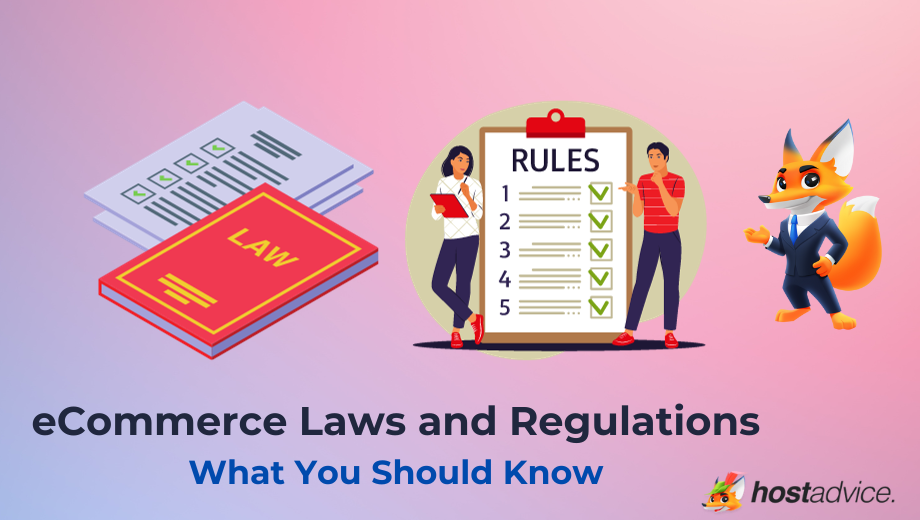
To have a successful eCommerce site and online business requires a solid understanding of eCommerce laws and regulations.
In this article, we discuss the key aspects of online business compliance, shedding light on the essential legal considerations that every eCommerce entrepreneur should be aware of.
Whether you’re a seasoned online seller or just starting to build your eCommerce business, follow these eCommerce guidelines and stay informed about the legal landscape shaping the eCommerce industry.
- eCommerce laws ensure fair and secure transactions for both businesses and consumers
- Consumer protection, data privacy, and intellectual property rights are key aspects of eCommerce regulations
- Legal frameworks address online security, competition, taxation, and accessibility in the digital marketplace
- Staying informed and adhering to eCommerce laws is essential for building trust, preventing disputes, and fostering a compliant online business
What Is eCommerce Legislation?
eCommerce legislation encompasses a set of laws and regulations governing online commercial activities and digital business. It addresses the legal framework that dictates how digital businesses operate, sell, and interact with consumers online.
These regulations cover a wide spectrum of how an online business operates, including consumer protection, data privacy, online contracts, and intellectual property rights.
Every country has different federal laws, eCommerce tax laws, export control laws—basically, any laws meant to protect consumers and govern online commerce transactions.
International eCommerce laws may look different than e-commerce law examples in the US. If you are looking to sell online in the US, you will need to be familiar with US federal law as well as specific state laws.
Who Regulates eCommerce in the US?
In the United States, eCommerce is subject to regulation by various entities at federal and state levels. Federal agencies such as the Federal Trade Commission (FTC) play a significant role in enforcing consumer protection laws and ensuring fair business practices.
FTC eCommerce regulations must be abided by if you are going to stay in business.
Additionally, individual states have their own regulatory bodies overseeing specific aspects of eCommerce, creating a complex but vital regulatory landscape. Understanding these regulatory authorities is important for compliance in the diverse and evolving eCommerce environment.
Why You Need to Understand How eCommerce Is Regulated
Understanding and adhering to eCommerce laws is paramount for the success and longevity of your online business and eCommerce store.
The importance extends beyond mere legal compliance; it directly contributes to safeguarding both your customers and your business.
Here are the two main reasons why every eCommerce entrepreneur needs a comprehensive understanding of eCommerce regulations.
Protect Your Customers
Ensuring the protection of your customers is a foundational principle of eCommerce regulation. Compliance with consumer protection laws and privacy regulations safeguards your customers’ rights, fostering trust and confidence.
As an online customer, you typically must enter your credit card information and other personal data in order to buy online. If there is a data breach, your personal information can be stolen, leading to fraud. Data protection is a primary concern in eCommerce law.
From transparent transaction practices to secure handling of personal information, prioritizing customer protection builds a positive reputation and encourages repeat business.
Protect Yourself
Comprehensive knowledge of eCommerce laws serves as a shield for your online businesses. It mitigates the risk of legal disputes, fines, and reputational damage were legal issues to arise, if you failed to safeguard consumer privacy, or if you failed to meet legal requirements.
By following established regulations, you demonstrate a commitment to ethical business practices, reducing the likelihood of legal challenges—or the Federal Trade Commission’s ire. Protecting your business interests aligns with sustainable growth, and contributes to resilient and legally sound commerce businesses.
eCommerce Laws to Protect Your Customers when Selling Online
Ensuring the safety and satisfaction of your customers is not just good business practice—it’s a legal imperative. Familiarize yourself with the key eCommerce laws designed to protect customers and customer data when selling online.
Keep Personal Data Private and Secure
- Website Tracking: Adhere to regulations governing website tracking practices. Be transparent about the use of cookies, provide options for user consent, and comply with laws like the General Data Protection Regulation (GDPR) for international customers to safeguard customer data.
- Email Marketing: Respect email marketing regulations, including obtaining explicit consent for communication, providing opt-out options, and refraining from deceptive practices. Compliance with laws like the CAN-SPAM Act is essential for maintaining ethical and legal email marketing.
- Privacy Policy: Craft a comprehensive privacy policy outlining how personal data is collected, used, and protected. Ensure transparency regarding data practices, and regularly update the policy to align with evolving legal requirements.
Securely Handle Customer Financial Data
Safeguarding financial information and customer data is critical for customer trust and legal compliance.
- Use secure payment gateways: Implement reliable and secure payment gateways to protect sensitive financial data during transactions.
- Adhere to PCI DSS standards: Comply with Payment Card Industry Data Security Standard (PCI DSS) requirements to ensure the secure processing of credit card information.
Provide Quality Products and Services
While not a specific law, providing quality products and services is foundational for customer satisfaction and legal compliance.
- Honor product descriptions: Accurately represent products or services to avoid misleading customers, which could lead to legal issues.
- Address customer concerns: Establish clear customer service policies to promptly address and resolve customer issues. This not only maintains customer satisfaction but also aligns with consumer protection laws.
By aligning your eCommerce practices with these laws, you not only protect your customers but also fortify the legal foundation of your eCommerce sites.
eCommerce Laws to Protect Online Businesses
Just as eCommerce laws safeguard customers, they also provide a framework to protect online businesses. Understanding and complying with these regulations is vital for the sustained success of your eCommerce venture.
Refer to this insightful guide on eCommerce Laws for a comprehensive overview.
Check If You Need to Form a Business Entity
- Legal Structure: Determine the most suitable legal structure for your eCommerce business—whether it’s a sole proprietorship, limited liability company (LLC), or corporation. Each structure has distinct legal implications, affecting aspects such as liability, taxation, and operational flexibility.
- Business Registration: Comply with business license and registration requirements based on your chosen legal structure for your company registration. This ensures legal recognition, tax compliance, and access to various benefits associated with formal business entities.
Ensure You Are Collecting Taxes Properly
- Sales Tax Compliance: Understand and adhere to sales tax regulations in jurisdictions where you conduct business. Comply with tax collection obligations, obtain necessary permits, and stay informed about tax rate changes to avoid legal repercussions.
There are various applicable laws that apply for eCommerce businesses: sales tax, specifically state sales tax, as well as other federal tax laws.
It’s always a good idea to get professional legal advice and speak to a tax professional, to ensure all sales taxes are properly paid.
Register Patents and Trademarks
- Intellectual Property Protection: Secure your brand’s intellectual property by registering trademarks and patents where applicable. This protects your brand identity, products, and innovations from infringement, enhancing your legal standing in the market.
Get Business Insurance If Necessary
- Liability Coverage: Consider obtaining business insurance to mitigate risks associated with liability, property damage, and other unforeseen circumstances. Adequate insurance coverage can shield your business from legal and financial challenges.
eCommerce Guidelines and Regulations You Need to Know
To ensure the success of your eCommerce business, strict adherence to specific guidelines and regulations is imperative.
Here’s a comprehensive exploration of the regulations and restrictions that eCommerce managers must navigate diligently to effectively manage an online store.
PCI Compliance
Payment Card Industry Data Security Standard (PCI DSS) is a non-negotiable aspect for eCommerce businesses engaged in payment card transactions. It is the bedrock ensuring the secure processing of credit card information, thereby safeguarding sensitive financial data. It is essential to familiarize yourself with the PCI Security Standards Council for comprehensive guidelines that underscore the importance of maintaining robust security measures.
Seeking professional advice regarding PCI compliance can be prudent, especially when dealing with intricate technicalities. Legal experts specializing in data security can provide tailored recommendations, ensuring your eCommerce business aligns with the latest standards and remains resilient against potential threats.
Additionally, attending industry-specific seminars or webinars on PCI compliance can enhance your understanding. Networking with professionals in the field can provide valuable insights and practical tips for implementing effective security measures.
Collaborating with cybersecurity firms that specialize in PCI compliance can offer a proactive approach. These firms can conduct thorough security assessments, identify vulnerabilities, and recommend measures to fortify your eCommerce platform against potential breaches.
Federal Trade Commission (FTC) eCommerce Regulations
The FTC assumes a central role in enforcing consumer protection laws within the realm of eCommerce. Understanding and adhering to these laws are crucial for businesses. To gain insights into regulations related to advertising, online privacy, and fair business practices, it is recommended to familiarize yourself with the FTC’s Bureau of Consumer Protection.
Navigating the intricacies of FTC regulations may require legal expertise, particularly when drafting advertising content or privacy policies. Seeking legal counsel can ensure that your business aligns with the FTC’s expectations, reducing the risk of regulatory challenges.
Regularly monitoring updates from the FTC and industry-specific publications is essential. Staying informed about evolving regulations enables your business to adapt swiftly, maintaining compliance and consumer trust.
Participating in industry forums and discussions can provide valuable insights. Engaging with other eCommerce professionals and legal experts in these forums allows you to share experiences, learn best practices, and stay updated on potential regulatory changes.
Product Restrictions
Ensuring compliance with legal and safety standards is a foundational responsibility for eCommerce businesses. Different products may be subject to specific regulations, and understanding these restrictions is critical to prevent legal complications that could adversely impact your business.
Implementing a robust product compliance program involves continuous education and awareness. Regularly training your team on product regulations ensures that everyone is aligned with the latest standards, minimizing the risk of unintentional violations.
Collaborating with industry associations and regulatory bodies can provide valuable guidance. These organizations often offer resources, workshops, and updates on product compliance, helping your business stay proactive and informed.
Maintaining transparent communication with suppliers is key. Ensuring that your suppliers also adhere to product regulations prevents potential issues down the supply chain, contributing to a seamless and compliant eCommerce operation.
Shipping Restrictions
Engaging in international eCommerce necessitates a keen awareness of shipping restrictions imposed by destination countries. It is essential to familiarize yourself with guidelines from the International Trade Administration to ensure seamless and compliant cross-border transactions.
Navigating international shipping regulations can be complex, and seeking advice from logistics experts or customs brokers is advisable. These professionals specialize in international trade and can provide insights on specific restrictions in various regions.
Collaborating with a global fulfillment partner can streamline compliance. Fulfillment partners often have expertise in international shipping regulations, ensuring that your eCommerce business meets the requirements of different countries.
Regularly monitoring updates in international trade agreements is crucial. Changes in trade policies can impact shipping regulations, and staying informed allows your business to adapt quickly and maintain compliance.
Inventory Size Regulations
Certain jurisdictions may impose regulations regarding the size of eCommerce inventories or storage facilities. Staying informed about any such restrictions is crucial to maintain legal compliance, ensuring your business operates within the boundaries set by regional authorities.
Regularly reviewing local regulations and zoning laws is essential. These regulations can evolve, and staying informed ensures that your business adapts to any changes in inventory size restrictions promptly.
Engaging with local business chambers and associations can provide insights. These organizations often have resources and contacts that can help your business navigate specific regulations related to inventory size.
Seeking legal advice on zoning regulations can offer clarity. Legal professionals can interpret complex zoning laws, ensuring that your eCommerce business complies with local regulations and avoids potential legal issues.
Age Restrictions
For eCommerce businesses dealing with products carrying age restrictions, implementing robust age verification processes is paramount. Adhering to applicable laws governing the sale of age-restricted items not only ensures legal compliance but also helps avoid potential consequences that may arise from non-compliance.
Implementing age verification tools on your eCommerce platform is a proactive measure. These tools can help verify the age of customers before completing a purchase, ensuring compliance with age restrictions.
Collaborating with age verification service providers can enhance your efforts. These services specialize in age authentication and can integrate seamlessly with your eCommerce system, providing an additional layer of compliance.
Educating your customer service team on age verification procedures is essential. Training ensures that your team can effectively handle age-related inquiries and troubleshoot any issues related to age verification processes.
When to Seek Professional Advice Regarding eCommerce Law
Approaching eCommerce laws independently is feasible, but certain eCommerce business situations warrant seeking professional advice to ensure comprehensive understanding and compliance.
Here are scenarios where consulting legal professionals is highly recommended for digital businesses:
- International Expansion: If your eCommerce business is expanding globally, the complexities of international laws and trade regulations necessitate expert guidance. Professionals can provide insights into cross-border transactions, customs compliance, and international tax considerations.
- Complex Legal Issues: In the face of intricate legal challenges, such as intellectual property disputes, complex contract negotiations, or regulatory investigations, legal experts can offer nuanced solutions. Their expertise ensures a thorough understanding of legal intricacies and tailored strategies for resolution.
- Policy and Procedure Review: Periodically reviewing and updating your eCommerce policies and procedures is essential. Legal professionals can assist in aligning these documents with the latest regulations, safeguarding your business against potential legal issues.
- Data Protection and Privacy Compliance: With the increasing emphasis on data protection, especially with laws like GDPR, seeking legal advice is crucial. Professionals can guide your business in crafting and implementing robust data protection policies, ensuring compliance with privacy regulations.
- Litigation and Dispute Resolution: In the event of legal disputes or the threat of litigation, legal counsel becomes indispensable. Professionals can navigate the legal processes, represent your business in negotiations or court, and work towards favorable resolutions.
- Regulatory Changes: Given the dynamic nature of eCommerce regulations, staying abreast of changes is vital. Legal professionals can interpret and apply evolving laws to your business, helping you adapt swiftly and maintain compliance.
- Contract Drafting and Negotiation: Whether dealing with suppliers, partners, or customers, well-drafted contracts are essential. Legal experts can ensure that contracts align with legal requirements, protecting your interests and minimizing the risk of disputes.
Remember, proactive legal advice can prevent potential issues for online retailers, safeguard your business interests, and contribute to its long-term success. When in doubt or facing intricate legal scenarios, consulting with a legal professional specializing in eCommerce can provide the necessary clarity and guidance.
Final Word
By prioritizing legal compliance and abiding by local laws, you can regulate cybersecurity measures, ensuring that ecommerce platforms implement robust security practices to protect sensitive customer information from cyber threats and breaches.
Stay informed, seek professional advice when necessary, and embrace legal considerations as integral to your eCommerce strategy. Now, you can begin building your online business.
Next Steps: What Now?
- Ready to launch your online store or provide services online? Check out the best hosting providers for eCommerce businesses
- Now that you are familiar with eCommerce law, you can begin building your website. Review the best eCommerce website builders to find the right program for you
Learn More About eCommerce
- How To Create an eCommerce Website Using WordPress
- eCommerce Website Cost
- Types Of e-Commerce
- Business Models In eCommerce
- Common E-Commerce Applications and Their Benefits
- eCommerce Website Development: Streamlining Your Business
- E-Commerce Dropshipping
- Wholesale eCommerce: How it Works + Tips to Get Started
- What Is B2G eCommerce?
- The Advantages and Disadvantages of eCommerce
- eCommerce Website Design: Best Practices and Examples
- Is eCommerce Profitable? Here’s What You Need to Know
- 20 eCommerce Business Ideas (+ Next Steps)
- eCommerce Personalization Guide with Benefits, Examples, & Tips







